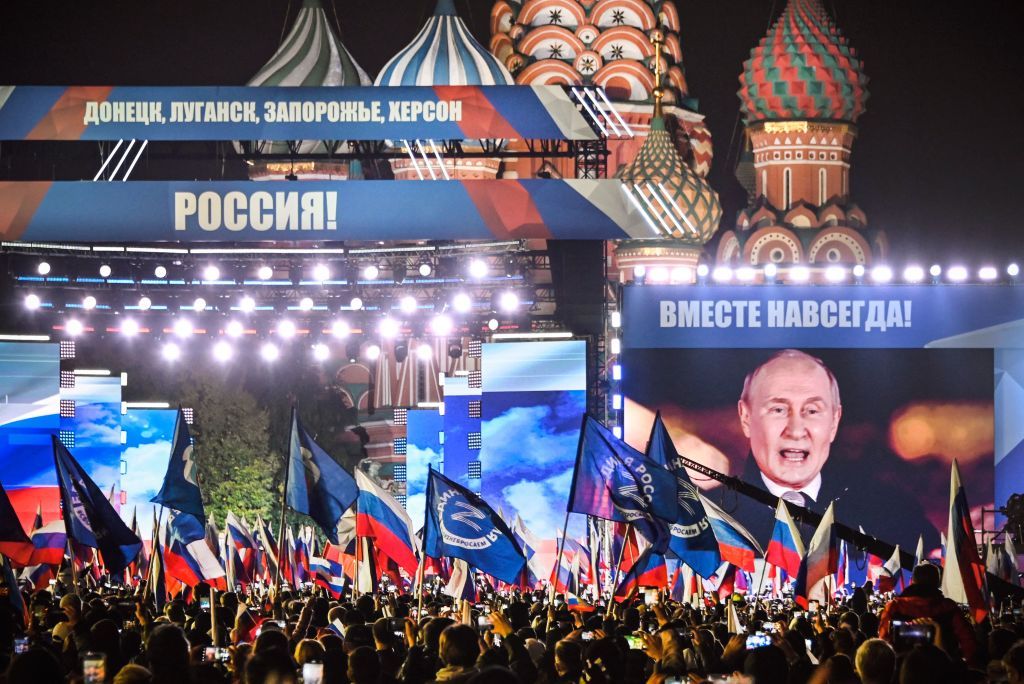As sanctions bite, Russia eyes Ukraine’s mineral resources to fund its invasion

Russia's 2024 federal budget brought little in the way of surprises, the country is gearing up for a long war.
Signed by President Vladimir Putin earlier this week, it ushered record levels of military spending — a sign of Moscow's commitment to its war against Ukraine.
While part of the Russian budget is undisclosed, making it hard to pinpoint specific areas of spending, the country's defense budget jumped from 3.9% of GDP to 6%, outstripping social spending for the first time in Russia's modern history.
The budget also revealed the Kremlin's vision for Russian-occupied areas of Ukraine.
Some 653.5 billion rubles ($7.4 billion) were allocated for rebuilding the annexed Ukrainian regions of Donetsk, Luhansk, Kherson, and Zaporizhzhia until 2026.
Crucially, special funds were laid aside to invest in the occupied area's mining industry.
Previously, Moscow largely sought to use Ukrainian territories ruled by Russian proxies in Donetsk and Luhansk as political and military leverage over Kyiv.
By proclaiming these areas to be "autonomous republics," Moscow could avoid investing in the areas, instead doling out the minimum of social support while effectively holding these territories hostage.
Now, it seems the Kremlin is increasingly set on using Ukraine's own wealth in natural resources to fund its ongoing aggression.
Ukraine contains considerable mineral wealth.
The country ranks in the top 10 globally for its stores of iron, manganese, titanium, graphite, and uranium. It also has some of the largest coal, oil, and gas reserves in the world.
In 2021, Ukraine's mining sector reported an output of $11.7 billion.
A significant portion of those resources are in the country's east, now bearing the full brunt of Russia's war.
Donetsk Oblast, in particular, has a well-established history of mining: The area contains 90% of Ukraine's coal reserves. Several lithium and rare earth deposits are in Donetsk and Zaporizhzhia oblasts, while offshore oil and gas reserves are concentrated in the Black and Azov seas.

So far, Russia's policy on eastern Ukraine's mineral wealth has been a simple one.
Moscow hasn't thrown its full weight into extracting and exploiting these resources because it has simply been enough to ensure that Kyiv can't use them either.
"More than 20 percent of all known Ukrainian deposits have been effectively 'controlled' by Russia since 2014," says Robert Muggah, co-founder of SecDev, a global digital risk and resilience firm.
It began mapping critical minerals and rare earth materials in Ukraine, as well as the country's agriculture, oil, and gas, in early February 2022.
"This does not mean these resources are being actively extracted or sold, but rather that they are no longer under the dominion of Ukrainian authority," he says.
Occupy and deny
So far, this fall in productivity — and the ensuing losses for Ukraine — have been a goal for Russia in itself, says Muggah. By controlling these deposits, Russia has effectively deprived Ukraine of billions of dollars of its own wealth.
SecDev estimates that 63 percent of Ukrainian reported coal mines are under Russian control as of July 2022.
This trend continues across other key sectors: Russia controls 27 percent of Ukraine's iron ore deposits, 50 percent of its manganese ore deposits, 100 percent of its strontium supplies, and roughly 20 percent of precious metal deposits.
According to SecDev estimates, the total worth of all Ukrainian mineral wealth now under Russian control is around $12 trillion.
"Denying Ukraine its mining and oil revenue is certainly a Russian priority because this effectively degrades (Kyiv's) military capacity," says Muggah. "Russia understands the geopolitical and economic advantages of controlling some of the world's richest mineral, coal, oil and gas deposits. Even if Russia were to do nothing and sit on Ukraine's mineral resources and infrastructure, it benefits by controlling supplies and rising prices."
Away from Russian-occupied areas, the ongoing instability caused by Moscow's war also undermines investor confidence.
Previously, Ukraine's large lithium deposits had generated significant attention from outside parties, including European Lithium and China's Chengxin Lithium. Now, such deals face an uncertain future, scuppering not only Ukraine's chances of securing more revenue but also building strategic business ties.
"At the very least, Russia has successfully blocked Europe from securing a strategic partnership with Ukraine," says Muggah.
New needs
The large amounts of money set aside in Russia's latest budget, however, suggest that this strategy is no longer enough. With renewed investment, Moscow will be able to mine Ukraine's resources and sell them to boost the Kremlin's coffers.
Extracting these resources will be no easy task. Alongside the many logistical problems that come with proximity to the front lines, the Kremlin will need to contend with the state of the mines themselves.
They will need investment because they have been allowed to decay.
The mines administered by Russian-led militants in the Ukrainian regions occupied by Russia since 2014 have performed poorly compared to those under Kyiv's control.
In 2017, the industrial output of the occupied territories of Donetsk Oblast was three times lower than in government-controlled areas — despite previously being almost equal before the war.
Yet, in the Kremlin's eyes, the investment could be worthwhile.

War is expensive — and the increased military spending outlined in the 2024 budget has Moscow looking for additional income, this time by exploiting Ukraine's resources.
Despite sanctions, Russia's war effort is still largely funded by its oil and gas sales. Adding Ukraine's coal and metal reserves to this calculation might be the next step.
"Based on 2022 data, we've seen 46 percent of Russia's federal budget being funded through taxes on oil and gas sales," says Isaac Levi, team lead at the Center of Research for Energy and Clean Air (CREA).
Levi's team works to identify fossil fuel exports from Russia and formulate effective economic countermeasures.
"It's an economy that's incredibly reliant on the export of fossil fuels. Since the start of the full-scale invasion, Russia has been more dependent than ever on oil earnings to basically fund the war."
That dependence has also grown as sanctions have shackled Russia's economy.
The federal budget could already herald trouble further down the line: In order to cover this increased spending, the treasury will have to receive 35 trillion rubles ($389 billion) — 22 percent more than it received in 2023.
In this context, increasing revenue from occupied areas of Ukraine is imperative.

Experts believe that if global powers truly wish to stop this cashflow — and by extension, curb Russia's ability to wage war against Ukraine — existing sanctions against Russia's export of natural resources need to be more strongly enforced.
Although sanctions have damaged Russia's economy, Moscow has managed to circumvent the worst of the embargo.
It has been able to find new buyers for their exports and transport them on shadow tankers: ships that are owned and insured in countries that are not implementing the sanctions.
"Russia has increased its ability to circumvent sanctions," says Levi. "They need to be monitored and enforced much quicker to prevent Russia's ability to find new ways around them."
For sanctions to have a greater effect, they must also be adopted by a wider range of countries, Levi says.
Despite the EU's embargo on the coal industry, coal production in Russia increased by 0.3 percent compared to 2021, reaching a record level of 442 million tons, according to CREA's data.
Meanwhile, an investigation by Reuters found that $14 million worth of coal — some 160,400 tons — produced in Russian-occupied areas of Ukraine were exported to Turkey in 2023.
Crucially, these steps should encompass not just fossil fuels but also minerals, rare earth metals, and products derived from coal, gas, and oil.
"Lots of the oil products are banned (under sanctions), but we think that should be expanded to other oil products such as liquefied gas and other residual products," says Levi.
"For example. Bulgaria had put an exemption on crude oil imports from Russia. It's brought to a refinery where it is changed into different products — and those products can be exported into countries imposing sanctions on Russia."
This will be difficult.
While Europe has taken great strides to wean itself off Russian resources, the process remains ongoing.
Even the switch to renewable energy has its pitfalls: The equipment needed to produce clean energy often contains the same rare earth minerals that Russia has seized in eastern Ukraine.
Yet if the international community does not act, ultimately, it is Ukraine that will suffer the consequences.
"Right now, there's a high correlation between any funds (from the sale of fossil fuels) flowing to the Kremlin and Russia's ability to fund military spending," says Levi.













